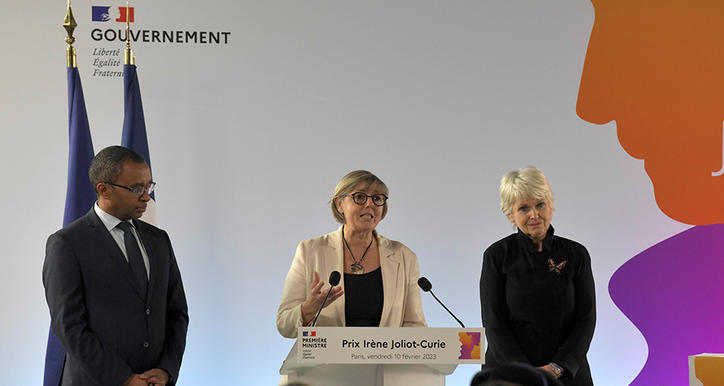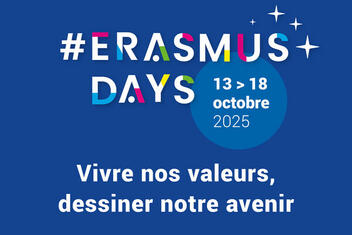
Success of the International Day of Women and Girls in Science
A resolution from the UNO general assembly adopted in 2015 acted the 11 February as the International Day of Women and Girls in Science To celebrate that day, France launched several actions, whether at the initiative of the ministry in charge of research or of associations such as Elles Bougent or Femmes Ingénieures, and of higher education institutions. Here’s an overview of these highly successful initiatives.
L’organisation de cette Journée est mise en œuvre par l'UNESCO et l’ONU-Femmes, en collaboration avec des institutions et des partenaires de la société civile qui souhaitent promouvoir les femmes et les filles. Comme le souligne l’UNESCO, l’égalité des genres est une priorité globale de l’organisme international et, surtout, « l’accompagnement des jeunes filles, leur formation et leur pleine aptitude à faire entendre leurs idées sont des leviers de développement et de paix ».
Un rôle essentiel dans la communautés scientifique et technologique
Rappelant que cette initiative s’inscrit dans les objectifs du Programme de développement durable à l’horizon 2030, de l'amélioration de la santé à la lutte contre le changement climatique, l’UNESCO estime que son succès « dépendra de la mobilisation de tous les talents ». Il est donc nécessaire, assure l’organisation, que davantage de femmes investissent ces domaines, car « la diversité dans la recherche élargit le bassin de chercheurs talentueux, apportant de nouvelles perspectives, du talent et de la créativité ». Cette Journée vient ainsi rappeler que « les femmes et les filles jouent un rôle essentiel dans les communautés scientifiques et technologiques et que leur participation doit être renforcée ».
C’est dans cet objectif que le ministère français chargé de la recherche a choisi cette date symbolique du 11 février pour remettre officiellement les prix Irène Joliot-Curie en faveur de la promotion des femmes dans les sciences, la recherche et l’innovation. Chaque année, ces prix récompensent des parcours exemplaires dans la recherche publique et privée, afin de mettre en lumière la « carrière de femmes scientifiques qui allient excellence et dynamisme ». En 2023, quatre femmes ont été mises à l’honneur, dont une jeune mathématicienne, Nina Hadis Amini, Prix de la jeune femme scientifique de l’année, chercheuse internationale d’origine iranienne qui a fait une partie de ses études en France.
Rêver en grand
« Moi aussi je rêve en grand ! », tel est par ailleurs le slogan de l’association Elles bougent qui a lancé à l’occasion du 11 février une opération de communication pour célébrer toutes les femmes de science et « inspirer les filles à poursuivre leurs rêves », les inviter « à rêver en grand » et à « explorer leur passion pour les sciences ». L’association Elles bougent, qui a en effet pour but de faire découvrir les métiers d'ingénieures et de techniciennes, fédère plus de 8000 marraines, 1600 relais et 300 partenaires qui luttent contre les stéréotypes limitant les aspirations des filles et des femmes. Concrètement, Elles bougent offre des « opportunités égales aux filles et aux femmes pour qu'elles puissent réaliser tout leur potentiel scientifique, mathématique, technique, technologique ». Une initiative d’autant plus nécessaire que, selon le sondage réalisé par l’association et rendu public le 11 février, une grande majorité des répondantes n’est pas allée jusqu’au bout de ses rêves…
L’association des Femmes Ingénieures a, de son côté, produit et réalisé un court métrage, en partenariat avec le ministère chargé de la recherche, dans lequel les étudiantes en science témoignent et en particulier deux jeunes filles, Éloïse et Roxane, étudiantes à l'ISEP (Institut supérieur d'électronique de Paris) s’expriment. Depuis plusieurs années, indique l’association, elles se préparent à devenir ingénieures, leur formation les passionne et c’est pourquoi « elles ont tenu à partager leur expérience afin d'inspirer les futures générations d'étudiantes en sciences ».
Vitalité de cette Journée dans les établissements français
En dehors des initiatives ministérielles ou associatives, sur le terrain, de très nombreux établissements, un peu partout en France, ont aussi joué le jeu. Sans chercher à être exhaustif on peut relever quelques actions :
-
à l’Université Paris-Saclay, qui a tenu à célébrer la Journée internationale des femmes et des filles de science, en invitant sur deux journées des classes d’école et de lycée avec pour objectif de sensibiliser aussi bien les filles que les garçons aux métiers de la recherche et « montrer la place des femmes dans la communauté scientifique et technologique ». Les élèves et lycéens ont ainsi pu assister à des ateliers en physique, chimie, biologie et suivre un atelier en sciences pour l’ingénieur ;
-
de même, l’Université de Nîmes a organisé une journée d'échange entre chercheuses et lycéennes, de façon à « inspirer des carrières scientifiques et montrer leur accessibilité grâce aux efforts scolaires », afin notamment de lutter contre « l'autocensure des filles autour des sciences et des technologies » ;
-
autre initiative à l’Université de La Réunion qui profité de cette Journée pour promouvoir de son côté une bourse qu’elle a mise en place, destinée aux étudiantes de la filière scientifique, qui a permis à une dizaine d’étudiantes de faire un stage ou de suivre une année universitaire à l’étranger ;
-
de son côté, l’Université de Bordeaux a mis en place un webinaire Women in Science afin de proposer des « stratégies à adopter pour construire une carrière dans la recherche » ;
-
l'Université́ Paris Dauphine - PSL a choisi pour sa part de donner un coup de projecteur sur six femmes scientifiques des centres de recherche de l’établissement qui se sont distinguées cette année ;
-
à l’Ecole Normale Supérieure de Lyon, c’est une Journée Sciences, un métier de femmes ! qui a été organisée en partenariat avec l’Université de Lyon, pour « montrer par l’exemple que tous les métiers scientifiques sont mixtes, décrypter les stéréotypes et dépasser les idées reçues », en accueillant des centaines de lycéennes.
Les chiffres clés
D’après le Ministère de l’Enseignement Supérieur et de la Recherche :
-
en 2020, 55 % des étudiants étaient des femmes ;
-
elles ne représentaient que 41 % des effectifs d'étudiants dans les filières scientifiques ;
-
dans le détail, 63 % des étudiants en sciences de la vie sont des femmes mais elles ne sont plus que 31 % en sciences fondamentales ;
-
28% des diplômés d’un titre d’ingénieur étaient des femmes en 2020. Elles étaient 22% en 2000.
Related contents
- International Day of Women and Girls in Sciencehttps://www.unesco.org/fr/days/women-girls-science
- Irène Joliot-Curie Prizes awardhttps://www.enseignementsup-recherche.gouv.fr/fr/le-prix-irene-joliot-curie-recompense-quatre-chercheuses-d-exception-88168
- The Moi aussi je rêve en grand ! operation of Elles bougent associationhttps://www.ellesbougent.com/agenda/actualites/moi-aussi-je-reve-en-grand-journee-internationale-des-filles-et-femmes-de-science-11-fevrier-2023-2683/
Recommended News



















































